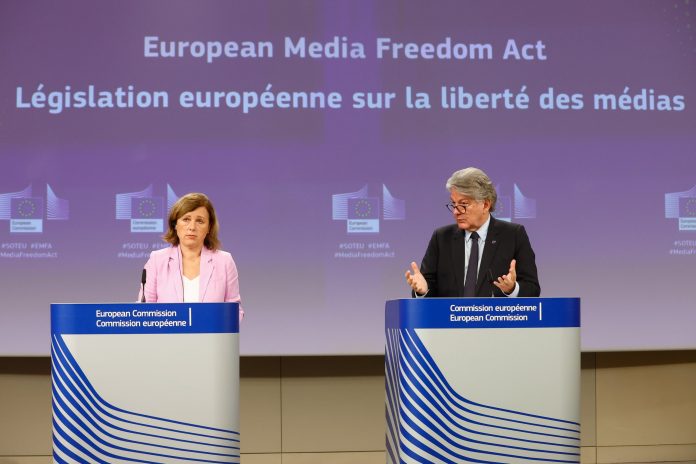The controversial European Media Freedom Act (EMFA) comes into force on Friday, expanding the European Commission’s powers to regulate the media landscape in EU countries.
Among the supporters of the new rules are European Parliament Vice-President Sabine Verheyen (EPP, Germany) and Chair of the Committee on Culture and Education Nela Riehl (Greens, Germany).
In a joint statement published on Thursday, the MEPs noted:
“August 8, 2025 is an important date for press freedom in the European Union. But it is not words that will determine the significance of this law, but actions. The real work is only just beginning – we must ensure that the EMFA is implemented fairly and fully in every EU country. Media freedom is not a matter of debate, but the foundation of democracy,” emphasised Verheyen, chair of the parliamentary working group on the implementation of the law.
Nela Riehl also added:
“With the adoption of the EMFA, Europe has set a high standard for the protection of press freedom and the work of journalists. This is a significant achievement, but it will only be meaningful if it is strictly enforced. I am concerned about the deterioration of the situation in some countries and call on all states to act in the spirit of this law.”
The new rules were approved by the European Parliament and the Council of the EU in February 2024.
Key points of the EMFA
EU countries are required to guarantee the independence of the media and exclude any interference in editorial policy.
It is prohibited to put pressure on journalists to reveal their sources. Arrests, searches of editorial offices and the installation of spyware are not allowed, except in rare cases with court authorisation in the investigation of serious crimes. Those affected by surveillance will be able to challenge it in court.
The heads and board members of state media must be elected through transparent procedures for a long term. They can only be dismissed before the end of their contract if they lose their professional qualifications. The funding of state media must be open, stable and predictable.
All media outlets and agencies are required to disclose information about their owners in a national database and to report any state financial support, including assistance from non-EU countries.
Large internet platforms (Facebook, X, Instagram, etc.) will have to distinguish media content from other sources. If they intend to remove a publication, they are obliged to notify the editorial office and give it 24 hours to respond. Removal is only possible in the event of a confirmed violation of the rules or failure to respond.
The EMFA will apply in all EU countries 15 months after its publication in the Official Journal of the EU. The gradual implementation of the law began in May 2024, and its key provisions will enter into force on August 8, 2025.
